Marinating meat enhances both flavor and tenderness, whether you’re cooking chicken, beef, pork, or seafood. A good marinade deepens flavor and tenderizes meat, making it easier to cook and more enjoyable to eat. But what is the best thing to marinate meat in, and how can you perfect the method? This guide covers the essentials to improve your dishes.
Marination works by breaking down proteins and infusing flavors. A proper mix of acids, oils, and seasonings keeps meat tender, juicy, and delicious. Whether you’re a beginner or experienced cook, adjusting marinades to different meats can greatly improve results. Learn more about using oils effectively in Is Avocado Toast a Healthy Fat?.
Beyond flavor, marination transforms tough cuts into tender meals and opens the door to global tastes like soy sauce or yogurt. Though simple, mastering the right techniques and timing makes all the difference.
Print
Classic Marinated Grilled Steak
- Total Time: 2 hours 20 minutes (including marination)
- Yield: 2 servings
- Diet: Gluten Free
Description
This marinated grilled steak recipe delivers a juicy, flavorful, and tender steak, thanks to a well-balanced marinade infused with garlic, soy sauce, and fresh herbs. The marinade enhances the natural richness of the beef while ensuring a perfectly seared crust. Ideal for weeknight dinners, BBQs, or special occasions, this steakhouse-quality recipe is easy to follow and results in a succulent, mouthwatering meal every time.
Ingredients
For the Marinade:
- ¼ cup soy sauce
- 2 tablespoons olive oil
- 1 tablespoon balsamic vinegar
- 1 tablespoon Worcestershire sauce
- 2 teaspoons Dijon mustard
- 1 tablespoon honey (or brown sugar)
- 3 cloves garlic, minced
- 1 teaspoon fresh rosemary, chopped (or ½ teaspoon dried)
- 1 teaspoon fresh thyme, chopped (or ½ teaspoon dried)
- ½ teaspoon black pepper
- ½ teaspoon red pepper flakes (optional, for heat)
For the Steak:
- 2 ribeye steaks (or NY strip, filet mignon, or sirloin, about 1-inch thick)
- ½ teaspoon salt (to season before grilling)
Instructions
Prepare the Marinade:
- In a medium bowl, whisk together soy sauce, olive oil, balsamic vinegar, Worcestershire sauce, Dijon mustard, honey, garlic, rosemary, thyme, black pepper, and red pepper flakes.
Marinate the Steak:
- Place the steaks in a resealable ziplock bag or shallow dish.
- Pour the marinade over the steaks, ensuring they are fully coated.
- Seal the bag or cover the dish and refrigerate for at least 2 hours (or up to 12 hours for deeper flavor).
Preheat the Grill:
- Remove the steaks from the fridge 30 minutes before cooking to allow them to come to room temperature.
- Heat the grill to 450°F (232°C) for high heat.
Grill the Steaks:
- Remove steaks from the marinade and pat dry with paper towels to ensure a good sear.
- Season both sides lightly with salt.
- Place the steaks on the grill and sear for 4-5 minutes per side for medium-rare (adjust time based on doneness preference).
- Use a meat thermometer to check:
- Rare: 120-125°F (49-52°C)
- Medium-Rare: 130-135°F (54-57°C)
- Medium: 140-145°F (60-63°C)
Rest and Serve:
- Transfer the steaks to a cutting board and let them rest for 5-10 minutes before slicing.
- Serve with grilled vegetables, mashed potatoes, or a fresh salad.
Notes
- Marination Time: Minimum 2 hours, but for the best results, marinate overnight.
- Alternative Cooking Methods:
- Pan-seared: Heat a cast-iron skillet over high heat and cook for the same duration.
- Oven-finished: Sear in a skillet for 2 minutes per side, then transfer to a 400°F (200°C) oven for 5-7 minutes.
- Steak Cuts: Works well with ribeye, sirloin, filet mignon, NY strip, or flank steak.
- Prep Time: 10 minutes
- Cook Time: 2-12 hours
- Category: Main Dish
- Method: Grilled
- Cuisine: American / Steakhouse
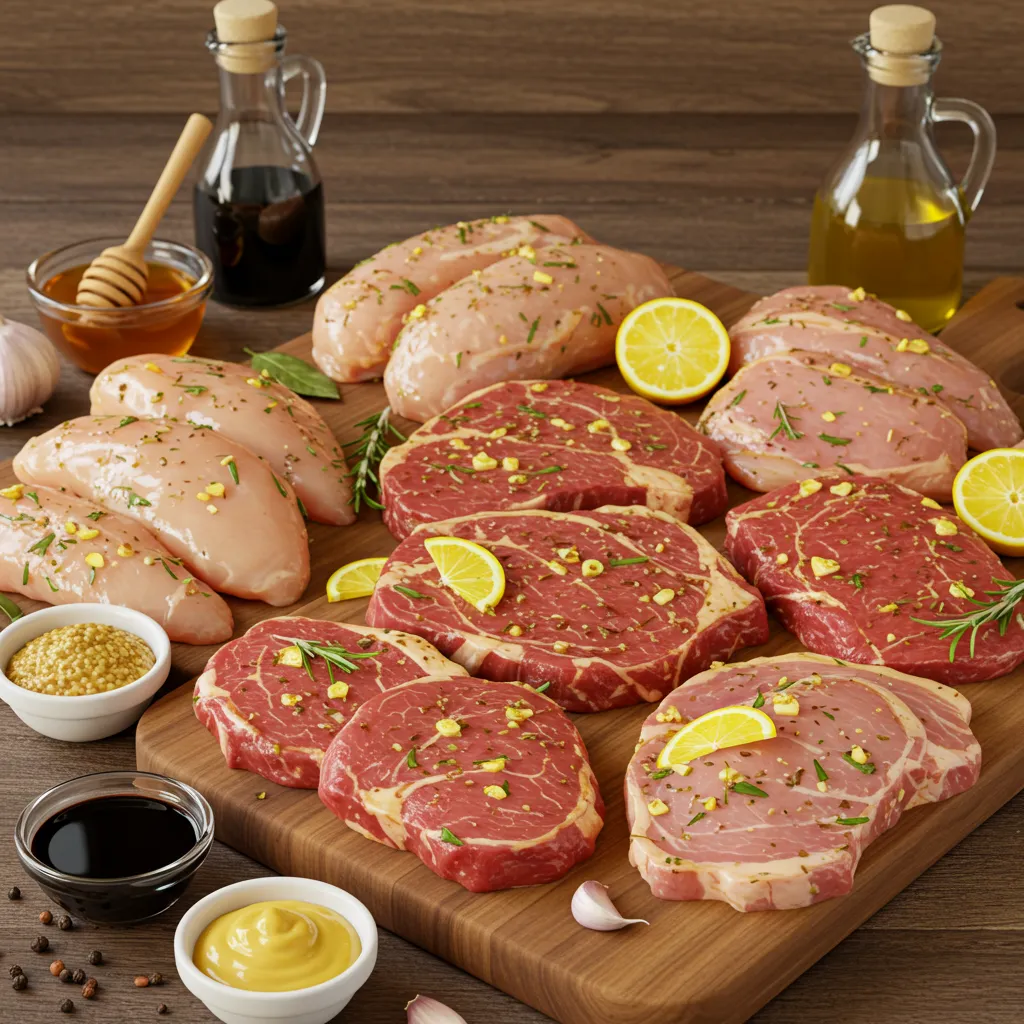
How Marinades Work: The Science Behind Flavor
Marinades blend acids, oils, and flavorings to tenderize and enhance meat. Acids like citrus juice, vinegar, and yogurt break down muscle fibers, making tougher cuts like flank steak more tender. Oils coat the meat, locking in moisture and helping flavors penetrate deeper, keeping the meat juicy even when grilled or broiled. Flavorings such as garlic, herbs, and soy sauce add richness and character.
Together, these elements transform meat, boosting its natural taste and texture. A soy marinade deepens beef’s flavor with umami, while lemon and herbs brighten chicken dishes. The key is balancing acid, oil, and flavor to suit the meat you’re preparing.
Acids are key for tenderization by denaturing proteins, but too much or too long can make the meat mushy. Oils balance this effect and add richness.
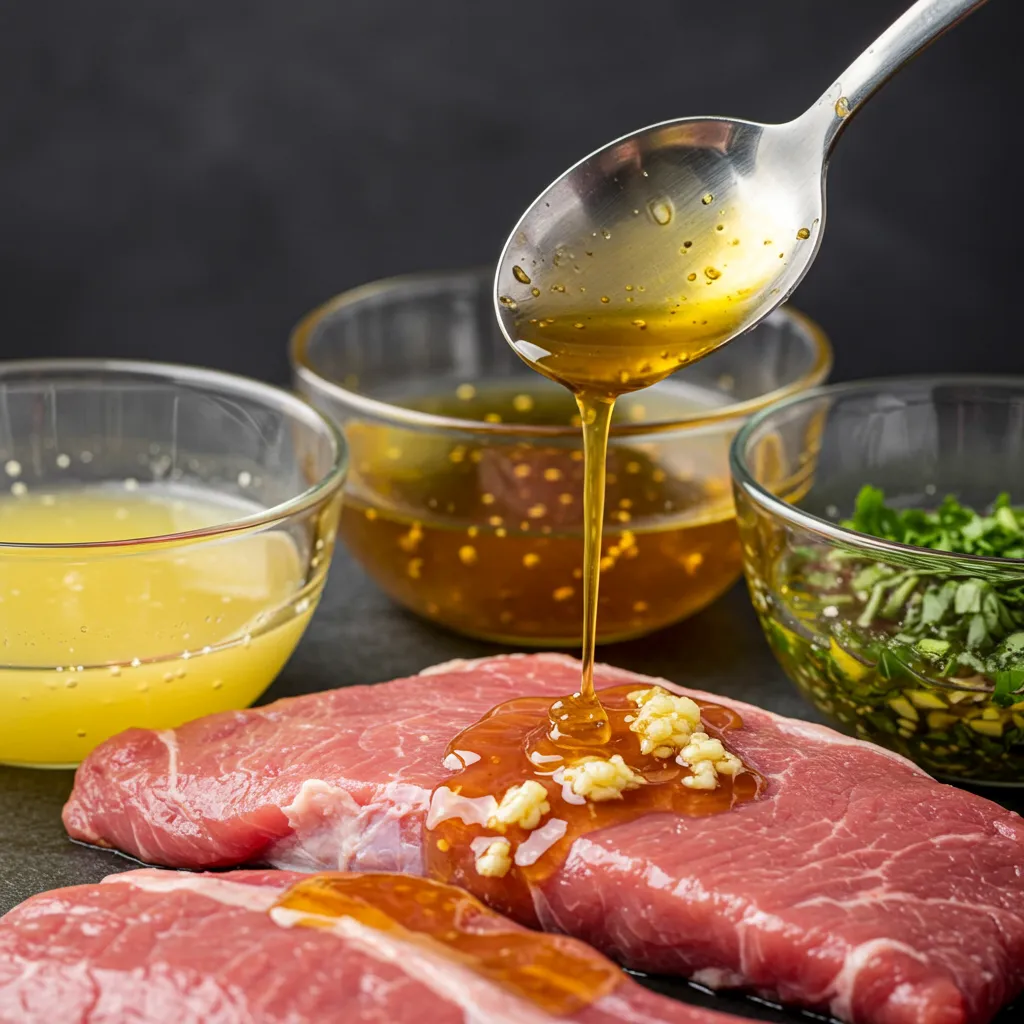
The Best Marinade Components for Different Meats
Choosing the right marinade based on the type of meat ensures the flavors enhance both taste and texture.
For Poultry
Chicken’s versatility makes it perfect for marinades. Buttermilk tenderizes and adds subtle tang, ideal for fried or roasted chicken. A citrus-herb blend with lemon juice, olive oil, garlic, and thyme brightens grilled chicken beautifully. For more ideas, visit What Does a What Does a Chicken Salad Contain?.
For Beef
Beef pairs well with bold marinades. Red wine, soy sauce, and Worcestershire deepen its richness, while herbs like rosemary or thyme add earthy notes. Acidic bases like balsamic vinegar help tenderize and add flavor to tougher cuts like flank steak.
For Pork
Sweet and tangy marinades highlight pork’s natural sweetness. Honey-mustard or apple cider vinegar with brown sugar enhances its flavor. For grilled pork chops, smoky spices like paprika or chipotle add an extra layer of depth.
For Seafood
Seafood needs a gentle touch. A soy-ginger marinade suits salmon and shrimp, while lemon-dill complements cod or tilapia. Limit marination to 30 minutes to maintain texture. Light, balanced marinades let seafood’s fresh flavor shine.

Recipes for Classic Best thing to marinate meat in
Creating a marinade is simple and rewarding. Here are a few simple marinades to try:
Classic Balsamic Marinade for Beef or Chicken
- ¼ cup balsamic vinegar
- 2 tablespoons olive oil
- 1 teaspoon minced garlic
- 1 teaspoon dried rosemary
Mix all ingredients, coat the meat, and refrigerate for at least two hours.
Sweet and Smoky BBQ Marinade for Pork
- ½ cup BBQ sauce
- 1 tablespoon apple cider vinegar
- 1 teaspoon smoked paprika
- 1 tablespoon brown sugar
- It gives ribs and pork chops a bold, smoky taste.
Soy-Ginger Marinade for Seafood
- ½ cup soy sauce
- 2 tablespoons sesame oil
- 2 teaspoons grated ginger
- 1 tablespoon honey
- Marinate fish or shrimp for 15–30 minutes for best results.
For a perfect side to these dishes, try Best Hellmann’s Potato Salad Recipe, adding a creamy contrast to the savory flavors.

How Long Should You Best thing to marinate meat in?
Marination time is just as important as the ingredients. Short marination may not flavor the meat enough, while over-marinating, especially with acidic bases, can ruin texture.
- Marinate thin cuts like chicken breasts or flank steak for 2–4 hours.
- Thicker cuts like pork loin or beef brisket: marinate 6–12 hours.
- Seafood: marinate 15–30 minutes to avoid mushiness.
Tips for Safe and Effective Best thing to marinate meat in
Refrigerate meat while marinating to keep it safe from bacteria. Use resealable bags or glass containers for even coating and easy cleanup. Never reuse marinade that touched raw meat unless boiled first.
Pat meat dry before cooking to promote browning and avoid steaming.. For more safe handling tips, check out Vegetable Stir Fry for Dinner.
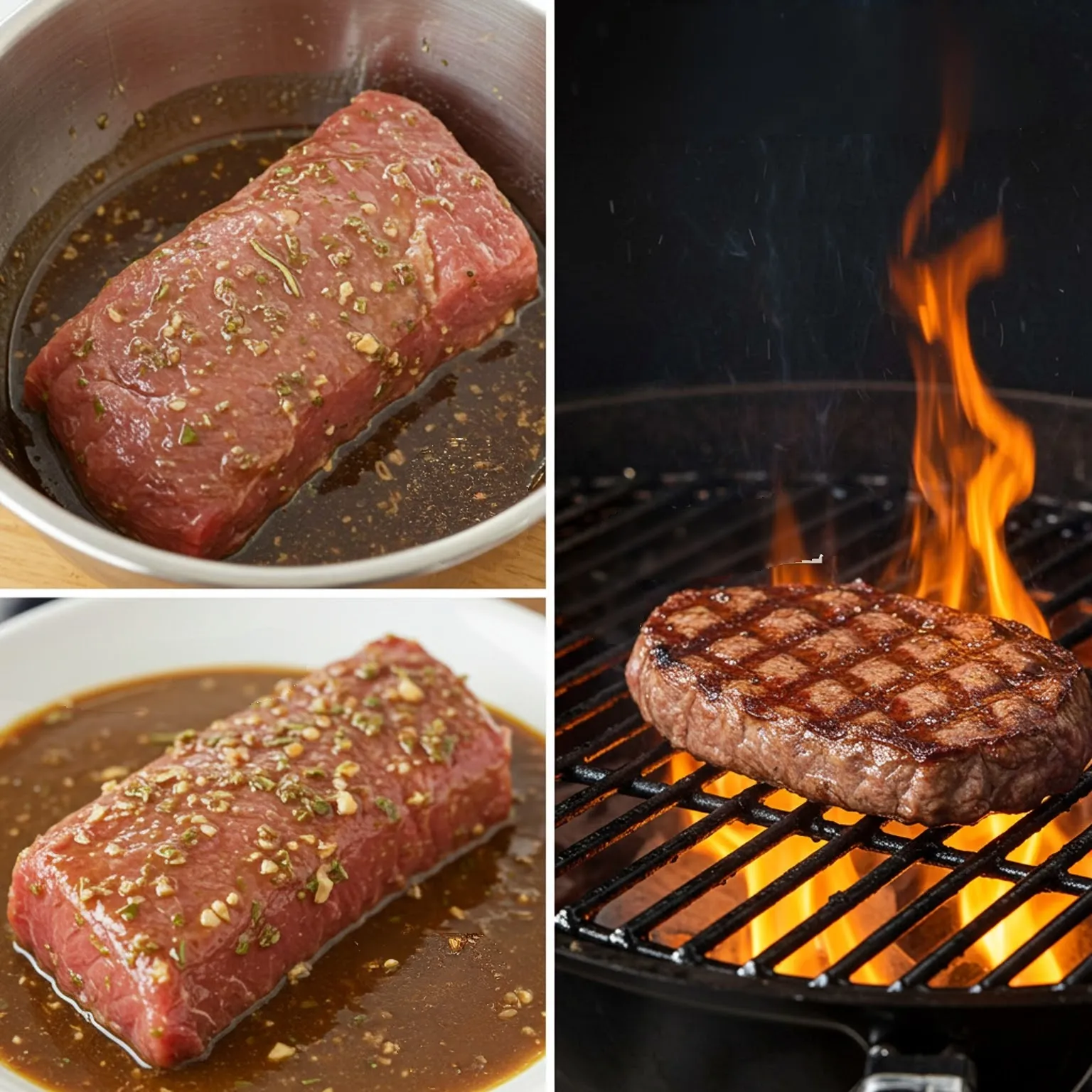
Common Mistakes to Avoid
Even with quality ingredients, marination can fail if mistakes happen. Avoid over-marinating, especially seafood and thin cuts, to prevent mushy textures. Balance acid, oil, and seasonings correctly. Without oil, meat may dry out, and uneven coating can leave some bites bland.
Benefits of Marinating Meat
Marinating not only boosts flavor but also supports digestion, reduces harmful compounds, and enhances nutrition.
Enhances Nutrient Absorption
Acids like vinegar, lemon juice, and yogurt help break down proteins, making nutrients easier to absorb. According to Mayo Clinic, natural acids improve digestion and nutrient bioavailability.
Reduces Harmful Compounds
Cooking meat at very high temperatures may trigger the development of potentially harmful substances. The National Cancer Institute reports that marinating with antioxidant-rich ingredients like garlic, rosemary, and thyme can cut these substances by up to 90%.
Improves Heart Health
Marinades with olive oil, avocado oil, or sesame oil add healthy fats that promote heart health. Research from the American Heart Association shows these oils lower bad cholesterol while boosting meat’s flavor and moisture.
Boosts Gut Health
Fermented ingredients like yogurt or miso add probiotics that support gut health. Harvard Medical School, notes that probiotics help balance the gut microbiome, aid digestion, and reduce inflammation.
Choosing natural, antioxidant-rich marinades ensures meals that are flavorful, tender, and health-conscious.
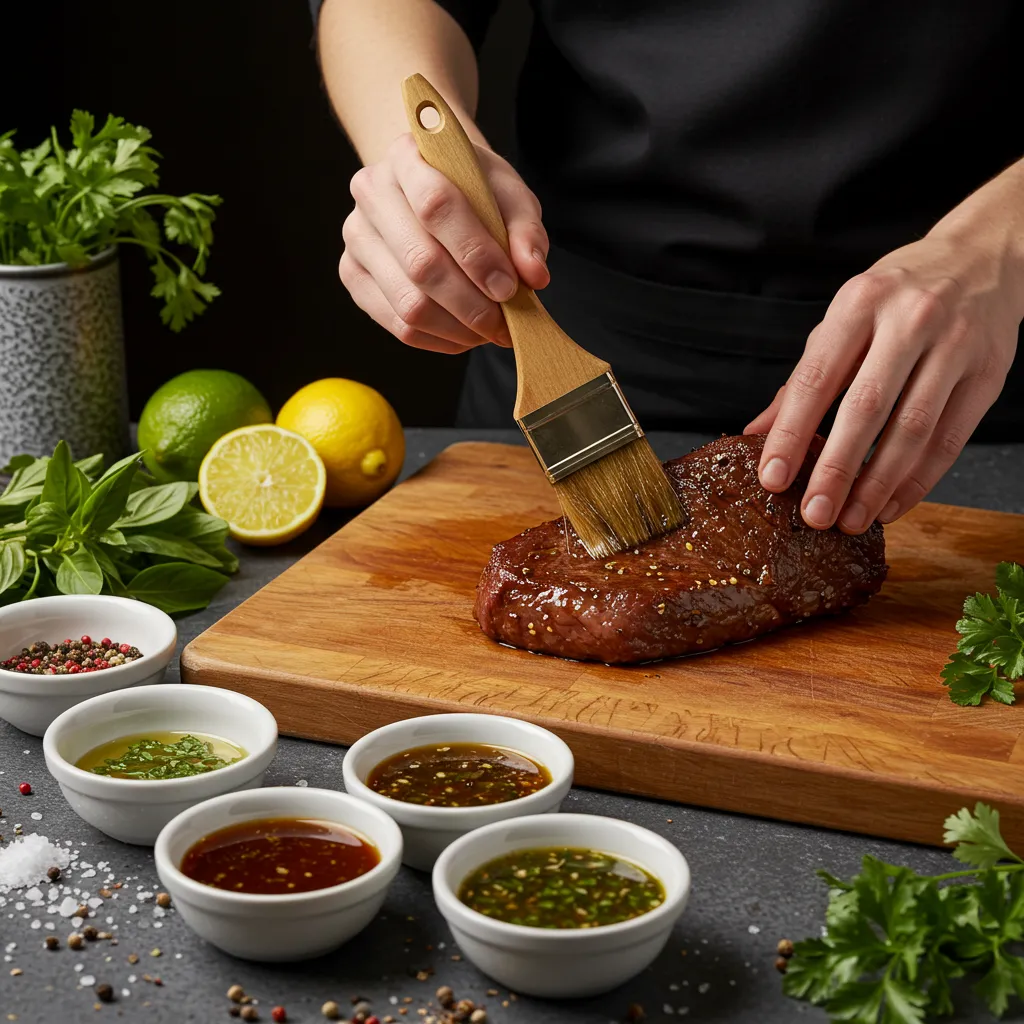
FAQs About the Best Way to Marinate Meat
Which ingredients make the best marinade?
A balanced blend of acid, oil, and seasonings suited to your meat delivers the best results.
Can I reuse marinade?
Not safely—unless it’s boiled to kill bacteria. Otherwise, discard it.
How long should meat marinate?
Thin cuts: 2–4 hours. Thicker cuts need 6–12 hours to absorb flavor and tenderize well.
Does marination work for all meats?
Yes, but tougher cuts benefit most. Premium cuts often require just a touch of seasoning.
What’s best for grilled meat?
For grilling, try a barbecue marinade with apple cider vinegar and brown sugar for balanced tang and sweetness.
Final Tips for Best Thing to Marinate Meat In
The best marinade depends on your flavor goals and cooking style. Try bold global options like miso or harissa for something unique. Taste your marinade and tweak the seasoning before using. With the right balance and approach, you’ll create tender, flavorful meals every time. For more ideas, explore What Does a Chicken Salad Contain?. Enjoy experimenting and savoring the results!

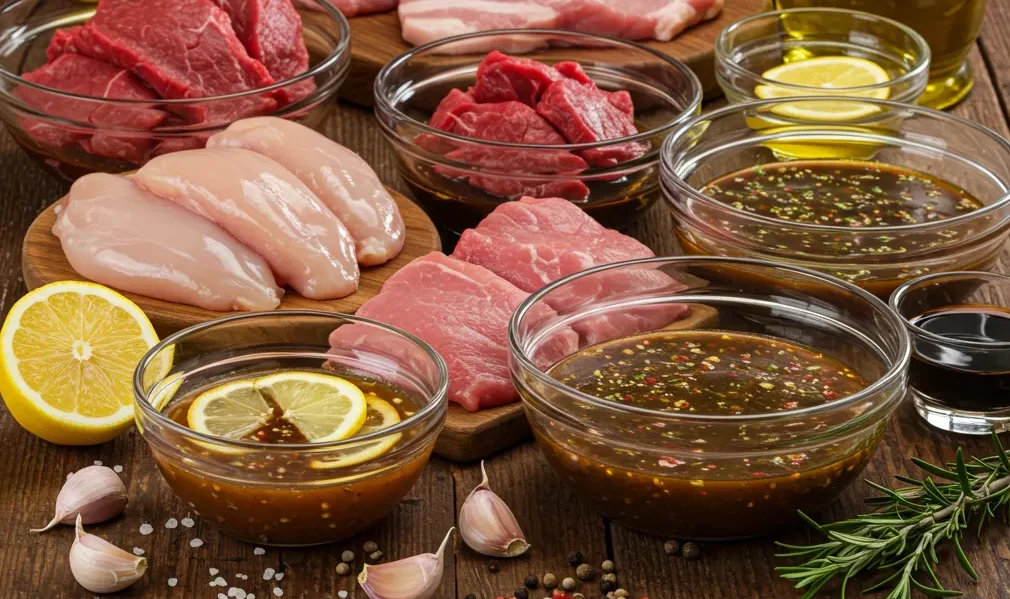
5 thoughts on “The Ultimate Guide: What is the Best Thing to Marinate Meat In?”